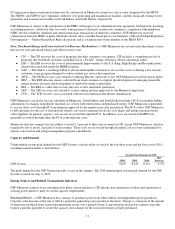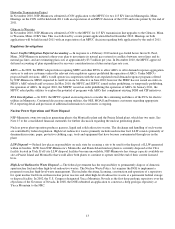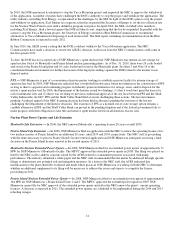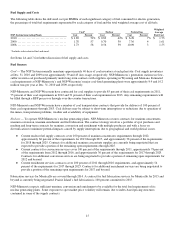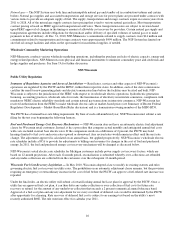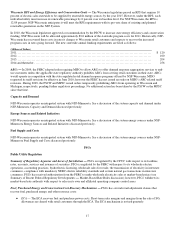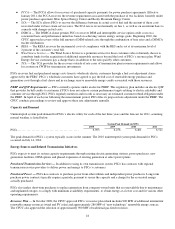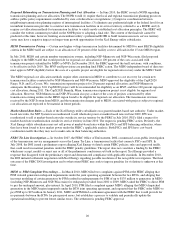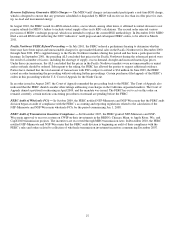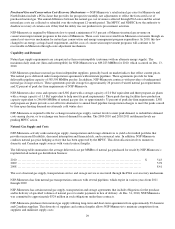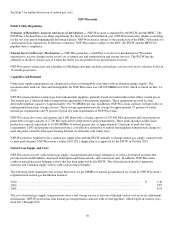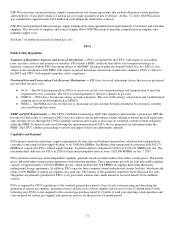Xcel Energy 2010 Annual Report Download - page 31
Download and view the complete annual report
Please find page 31 of the 2010 Xcel Energy annual report below. You can navigate through the pages in the report by either clicking on the pages listed below, or by using the keyword search tool below to find specific information within the annual report.21
Natural gas — PSCo uses both firm and interruptible natural gas and standby oil in combustion turbines and certain boilers.
Natural gas supplies for PSCo’s power plants are procured under contracts to provide an adequate supply of fuel. The supply
contracts expire in various years from 2011 through 2021. The transportation and storage contracts expire in various years from
2011 to 2040. The majority of natural gas supply contracts have pricing features tied to changes in various natural gas indices.
PSCo hedges a portion of that risk through financial instruments. See Note 11 to the consolidated financial statements for further
discussion. Most transportation contract pricing is based on FERC approved transportation tariff rates. These transportation rates
are subject to revision based upon FERC approval of changes in the timing or amount of allowable cost recovery by providers.
Certain natural gas supply and transportation agreements include obligations for the purchase and/or delivery of specified
volumes of natural gas or to make payments in lieu of delivery. At Dec. 31, 2010, PSCo’s commitments related to supply
contracts were approximately $817 million and transportation and storage contracts were approximately $1.0 billion.
Wholesale Commodity Marketing Operations
PSCo conducts various wholesale marketing operations, including the purchase and sale of electric capacity, energy and energy
related products. PSCo uses physical and financial instruments to minimize commodity price and credit risk and hedge supplies
and purchases. See Item 7A for further discussion.
SPS
Public Utility Regulation
Summary of Regulatory Agencies and Areas of Jurisdiction — The PUCT and NMPRC regulate SPS’ retail electric operations
and have jurisdiction over its retail rates and services and the construction of transmission or generation in their respective states.
The municipalities in which SPS operates in Texas have original jurisdiction over SPS’ rates in those communities. Each
municipality can deny SPS’ rate increase. SPS can and does then appeal municipal rate decisions to the PUCT, which hears all
municipal rate denials in one hearing. The NMPRC also has jurisdiction over the issuance of securities. SPS is regulated by the
FERC with respect to its wholesale electric operations, accounting practices, wholesale sales for resale, the transmission of
electricity in interstate commerce, compliance with mandatory NERC electric reliability standards and certain natural gas
transactions in interstate commerce. SPS has received authorization from the FERC to make wholesale electric sales at market-
based prices (see Summary of Recent Federal Regulatory Developments - Market-Based Rate Rules discussion).
Fuel, Purchased Energy and Conservation Cost-Recovery Mechanisms — Fuel and purchased energy costs are recovered in
Texas through a fixed fuel and purchased energy recovery factor, which is part of SPS’ retail electric tariff. The regulations allow
retail fuel factors to change up to three times per year.
There is an accounting of over- or under-recovery of fuel and purchased energy expenses under the fixed factor. Regulations also
require refunding or surcharging over- or under-recovery amounts, including interest, when they exceed 4 percent of the utility’s
annual fuel and purchased energy costs on a rolling 12-month basis, if this condition is expected to continue.
PUCT regulations require periodic examination of SPS fuel and purchased energy costs, the efficiency of the use of fuel and
purchased energy, fuel acquisition and management policies and purchased energy commitments. SPS is required to file an
application for the PUCT to retrospectively review fuel and purchased energy costs at least every three years.
The NMPRC has authorized SPS to use a monthly adjustment factor for a FPPCAC for SPS’ New Mexico retail jurisdiction.
NMPRC regulations require SPS to periodically request authority to continue using its FPPCAC. The NMPRC reviews SPS’ use
of its FPPCAC since the filing of its previous fuel clause continuation filing. As a follow-up to SPS’ last rate case, the NMPRC
conducted an audit of SPS’ fuel and purchased power costs for a 12 month period from July 2009 through July 2010 and the
tracking mechanism to capture costs and revenues associated with SPS’ RECs from assorted wind projects for the 12-month
period from July 2009 through July 2010. Audit results are expected in the first quarter of 2011.
SPS recovers fuel and purchased energy costs from its wholesale customers through a monthly wholesale fuel and purchased
economic energy cost adjustment clause accepted for filing by the FERC.


